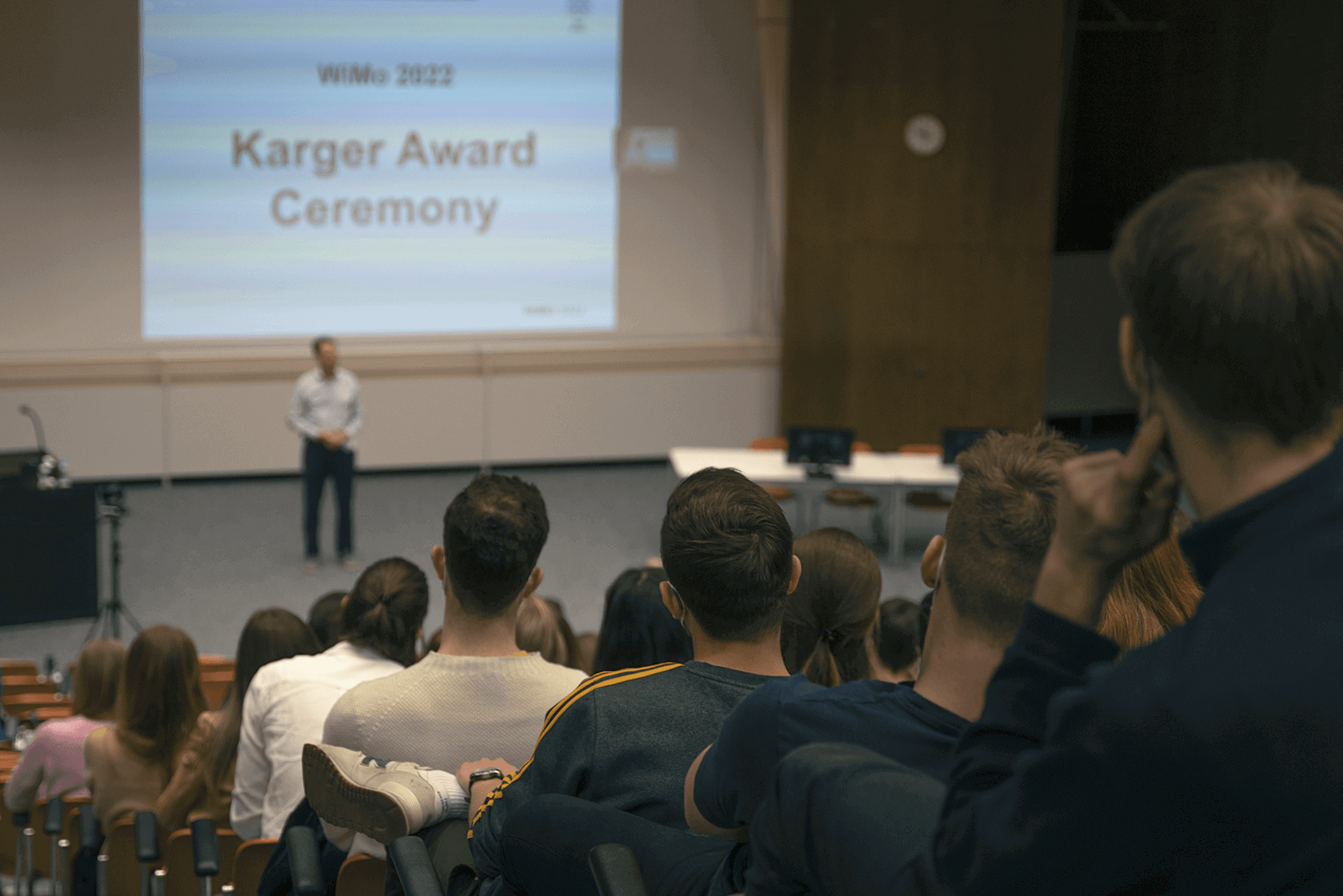Last Friday, 25 March 2022, the annual Science Month (Wissenschaftsmonat or WIMO) was rounded off with the presentations of the six finalists. See who the finalists were and what earned three of them the Karger Prize. In addition, find out why supporting this event is so close to the heart of our chairwoman Gabriella Karger.
Gabriella Karger, what is Science Month?
Science Month is an annual event held at the Faculty of Medicine of the University of Basel. For one month, students learn how to create, understand, and communicate scientific content. The Science Month Congress caps off the event.
This congress always features an invited keynote speaker. This year, Professor Gordon Guyatt from Canada will talk about “evidence-based medicine” (EBM) which describes the approach to medical education and practice.
And then six finalists are given 15 minutes each to present their own master’s theses and answer questions from the jury and the audience. About 220 participants usually attend.
For the first time, this final event took place in a hybrid format due to the global COVID-19 pandemic.
Why does Karger support it?
The idea of creating the Science Month was a fantastic idea of the Faculty of Medicine of the University of Basel which we supported from the very beginning. Since the Bologna Reform started, all medical students have had to write a scientific master’s thesis in order to be admitted to the final examination. With the aim of providing students with the necessary knowledge, the faculty had decided in 2011 to organize this Science Month for students in their final year. The knowledge and skills imparted during the Science Month, as well as the time slots for self-study, allow students to learn general skills such as writing and evaluating abstracts or creating and giving a scientific presentation, and to actively apply them using their own master’s thesis as an example.
What does our involvement look like?
Firstly, we sponsor the Karger Prize, which goes to the three winners selected by a jury of professors of the Faculty of Medicine on the Congress Day that caps off the event. Secondly, Paul Lavender, the Lead of our Strategic Competence Center Education & Learning, hosts a seminar on “Open Access and Predatory Journals”. Predatory journals publish articles with little or no peer review in exchange for financial remuneration. Often, authors only find out they are dealing with a predatory journal when their paper is already published, and then it’s too late. Since predatory journals are not listed in the major databases, all the hard work of the authors was in vain. On top of that, their reputation is damaged, and they might have problems receiving funding. Therefore, we want to educate young researchers about these dangers in our seminar so they can already avoid those pitfalls early in their careers.
We also layout and publish the 198 abstracts of all participants of the Science Month in the Abstract Book. For some of the students this is the first time they see their name in connection with a published scientific work.
Who won the Karger Prize at this year’s Science Month?
After the 15-minute presentation of their master’s thesis, the finalists (Caterina Mariani, Lilian Mayrhofer, Vanessa Michlig, Maja Ramin-Wright, Sophia Reimann and Samuel Zumbrunn) answered questions from the audience. The 3rd prize went to Maja Ramin-Wright the 2nd prize to Vanessa Michlig, and the winner is Caterina Mariani. I would like to thank all participants, and I want to congratulate the winners on their outstanding ways to communicate science.

WIMO Finalists 2022
What made them win? Or maybe to put it differently: What is important in science communication?
Scientific articles must follow a certain structure: The abstract and introduction are followed by the explanation of the methods. After this, the results are presented and discussed. Of course, the sources are also important to mention. So, there is a whole lot of rules to follow and there are certain parts that cannot be left out. Apart from all these rules, the text also needs to be written in a convincing way. After all, a researcher wants to win over the reader of the article to support their line of thought and trust their results.
And why is supporting young scientists so important to Karger?
Distributing scientific findings in written form is still the foundation of scientific success. With their research results, young scientists will shape the future of health sciences. So, by actively contributing to the Science Month, we aim to advance young researchers as well as the health sciences. This is why we see supporting young researchers as such an important task, especially in Basel where our headquarters are located.






Comments
Share your opinion with us and leave a comment below!